Abacus Data Poll: Conservatives open up their largest lead yet.
From April 3 to 9, 2024 Abacus Data conducted a national survey of 2,000 adults exploring several topics related to Canadian politics and current events as part of our regular national omnibus surveys.
In this edition of our Canadian politics tracking, we report on our usual metrics along with some new data on how Canadians feel about the Trudeau government and the relationship with vote intention.
This survey comes at an interesting moment to gauge public opinion. All of the interviews were done following the increase in the federal carbon price on April 1 and in the midst of several pre-budget announcements by Prime Minister Trudeau and the Liberal government. Controlling for the independent effect of each of these is difficult but the before/after nature at least allows us to understand what has happened.
Conservatives lead by 20 over the Liberals
If an election were held today, 44% of committed voters would vote Conservatives with the Liberals at 24%, the NDP at 17% and the Greens at 5%. The BQ is at 29% in Quebec.
Since our last survey, the Conservatives are up 3, the Liberals are up 1, while the NDP is down 2. This 20-point lead is the largest we have ever measured for the Conservatives and the first time the Conservative vote share has hit 44% nationally.
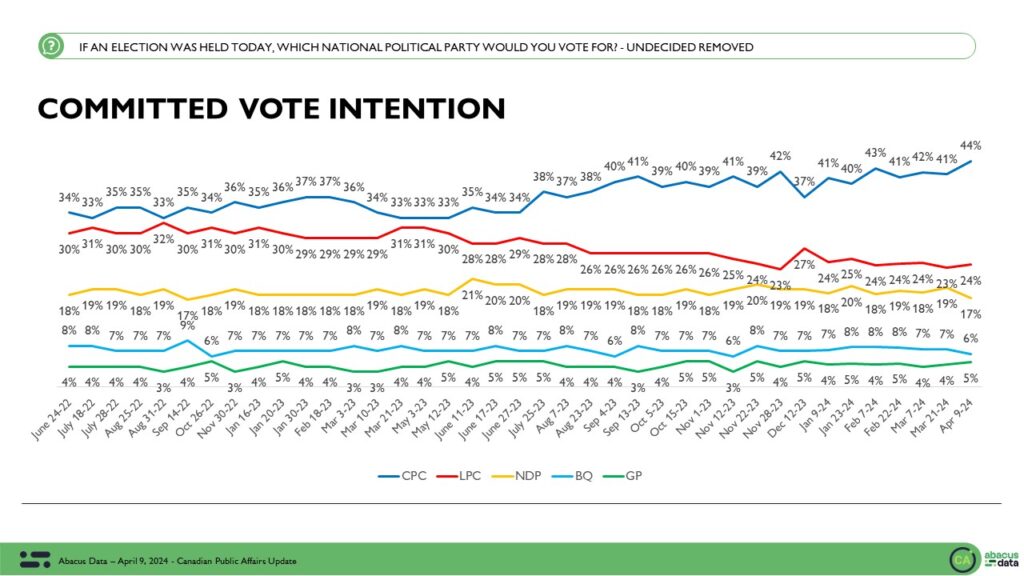
Regionally, the Conservatives are well ahead in the Prairies, lead by 25 in BC and 19 in Ontario. In Atlantic Canada, the Conservatives are 18-points ahead of the Liberals while in Quebec, the Liberals, BQ, and Conservatives are all in a statistical tie for first.
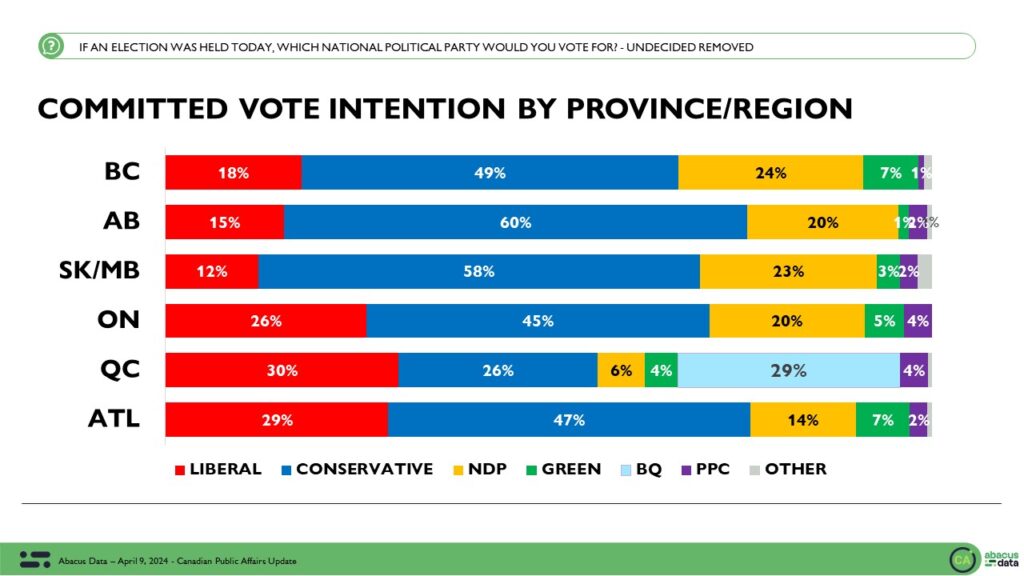
If we isolate British Columbia, Ontario, and Atlantic Canada only, we find the Conservatives gaining 2 to 46% while the Liberals are down to their lowest level since tracking this at 25%.
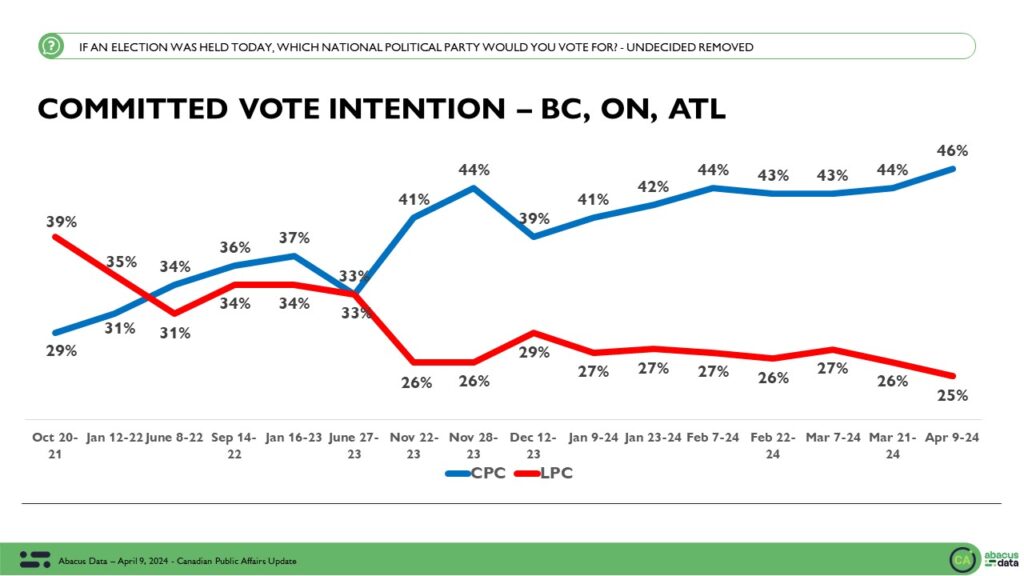
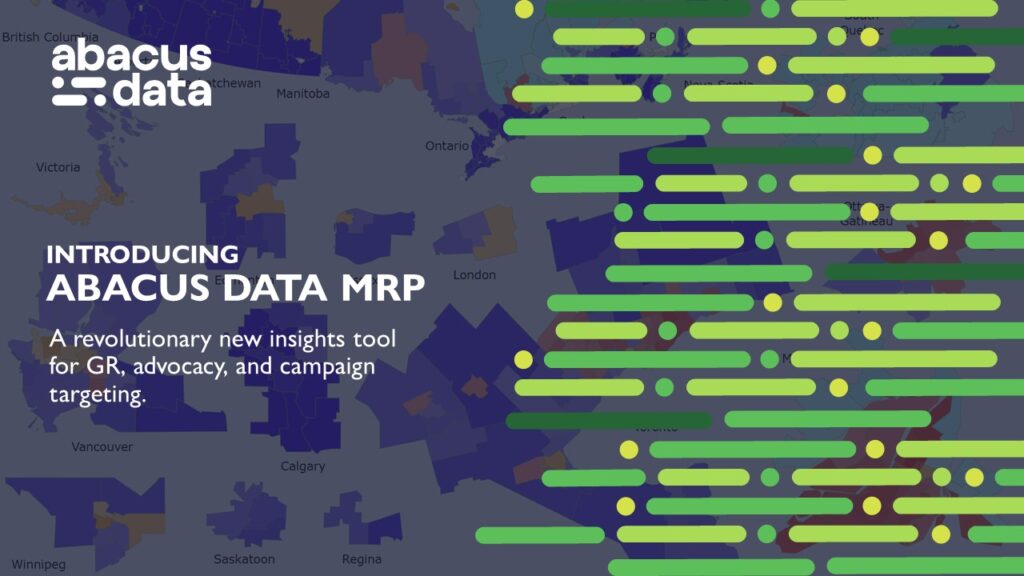
Demographically, the Conservatives lead among all age groups still. The NDP support among younger Canadians has dropped a bit and they are now third among those aged 18 to 29. The Conservatives lead by 19 among 18 to 29 year olds, by 20 among those aged 30 to 44, by 23 among 45 to 59 year olds and by 18 among those ahed 60+.
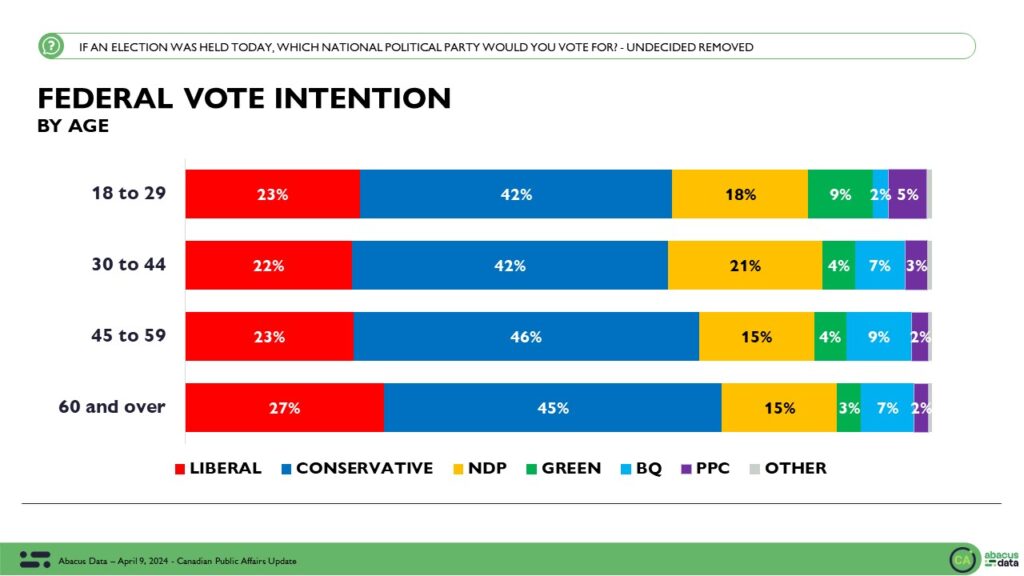
The Conservatives continue to capture a larger share of the vote among both men and women. Liberal vote share is the same among men and women while the NDP does 7-points better among women than it does among men.
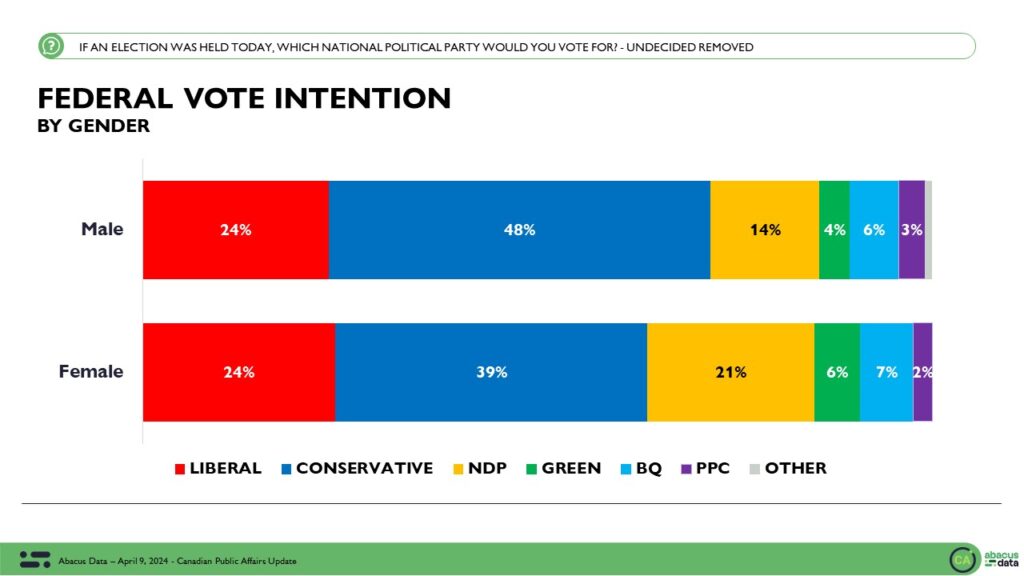
When we ask people if they would consider voting for each of the main political parties, 53% say they are open to voting Conservative (up one from last month) while, 40% are open to voting Liberal (down 1). 40% say they are open to voting NDP, 26% for the Greens, and 21% for the People’s Party.
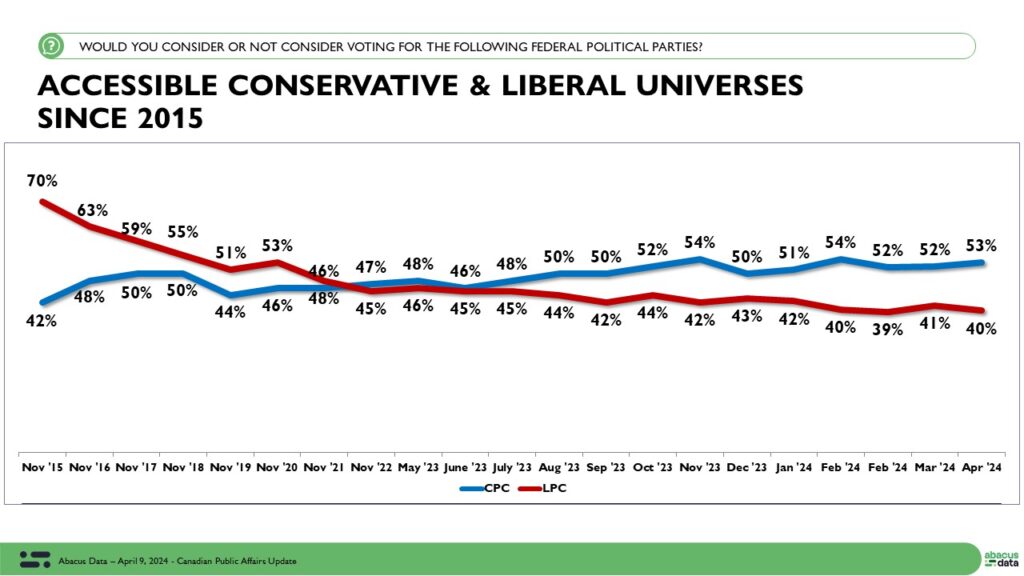

We continue to measure voter motivation by political party.
We find that the motivation gaps has closed as the Conservative voter coalition has grown. Today 70% of Conservative supporters say they will definitely vote compared with 65% of Liberal supporters and 64% among NDP supporters. Those who are say they would vote Green are the least motivated at the moment.
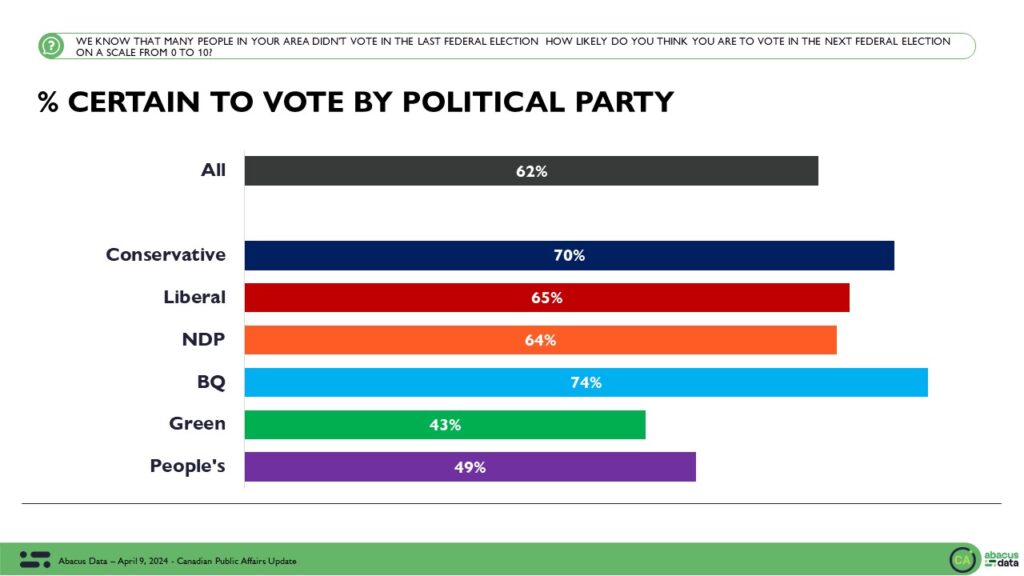
What else are Canadians thinking?
The mood of the country hasn’t changed since last month and has held fairly stead since the beginning of the year. Today, only 1 in 4 think Canada is headed in the right direction and only 17% feel optimistic about the direction of the world as a whole. This mood continues to be very negative.
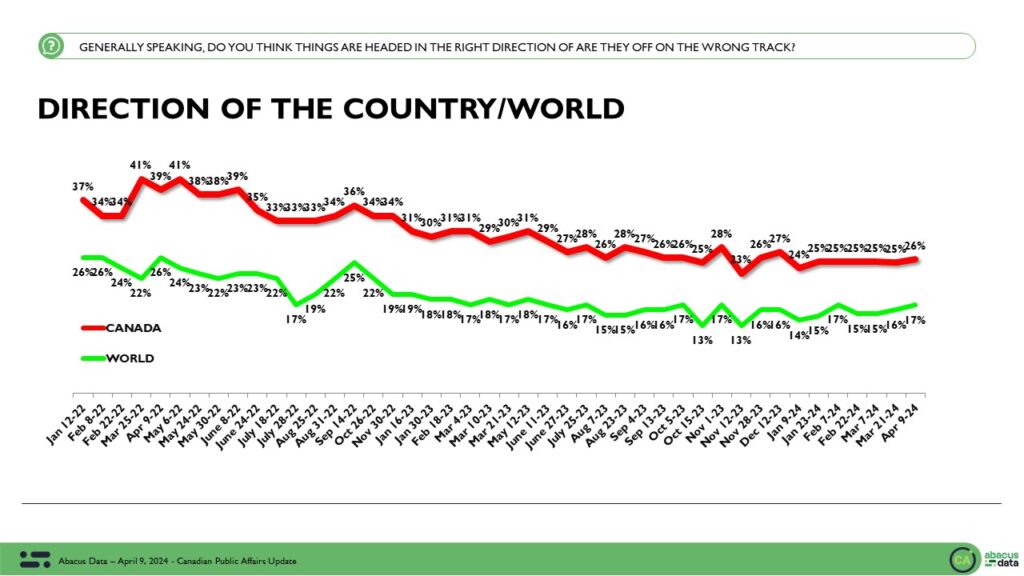
The federal government’s approval rating is unchanged from last wave. 26% approve while 60% disapprove of the job performance of the federal government led by Justin Trudeau, up a single point and within the margin of error. Those disapproving of the federal government’s performance has been between 56% and 60% since September 2023 but this is the first time that disapproval has hit 60% in our tracking of the Trudeau government.
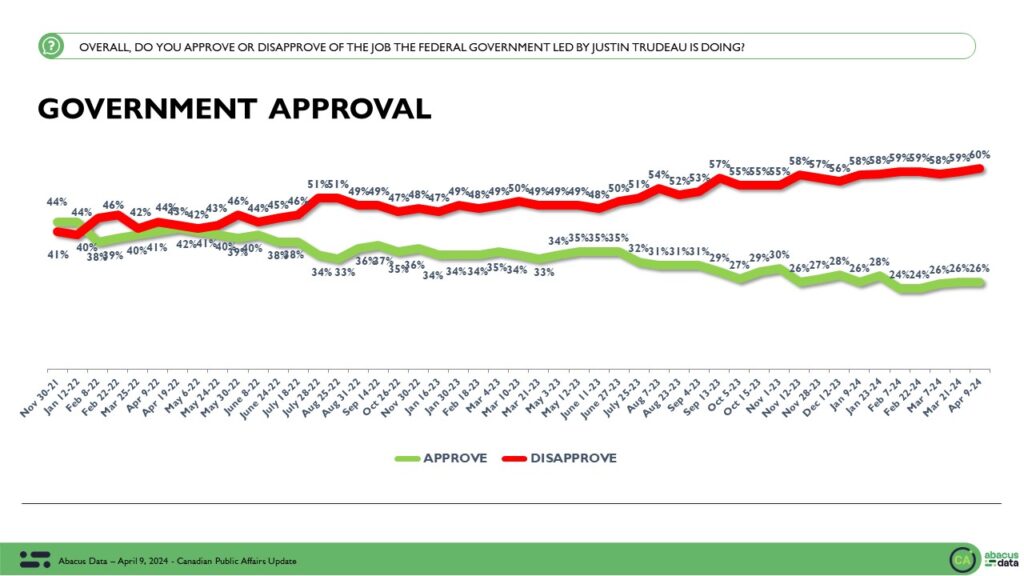
Impressions of Justin Trudeau are static. 58% have a negative impression of the Prime Minister and 25% have a positive view for a net score of -33.
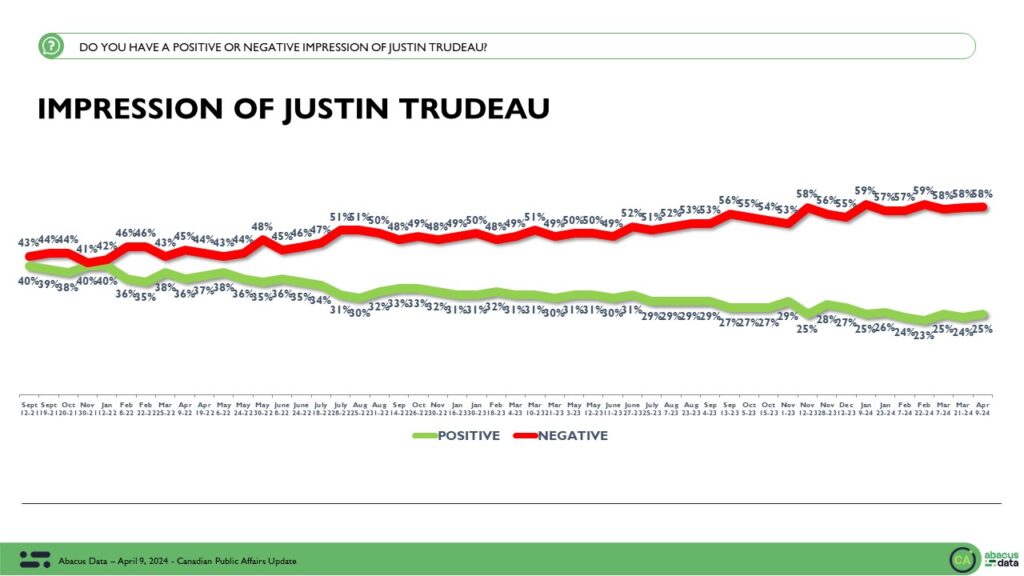
In contrast, impressions of Pierre Poilievre are also unchanged with 39% viewing him positively and 34% negatively for a net score of +5.
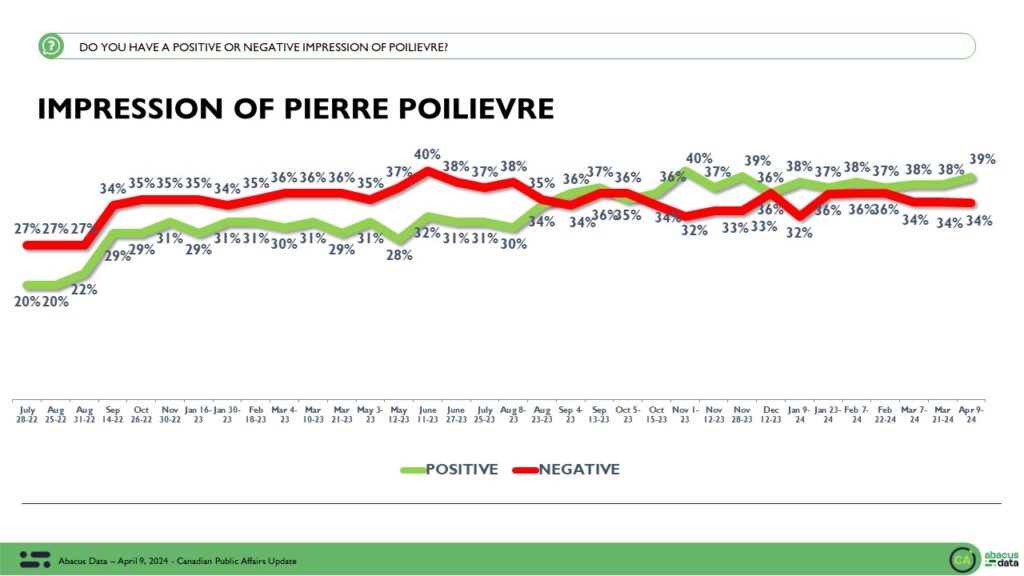
Feelings about NDP Leader Jagmeet Singh are also largely unchanged. Today 34% have a negative impression compared with 33% who have a positive one for a net score of -1.
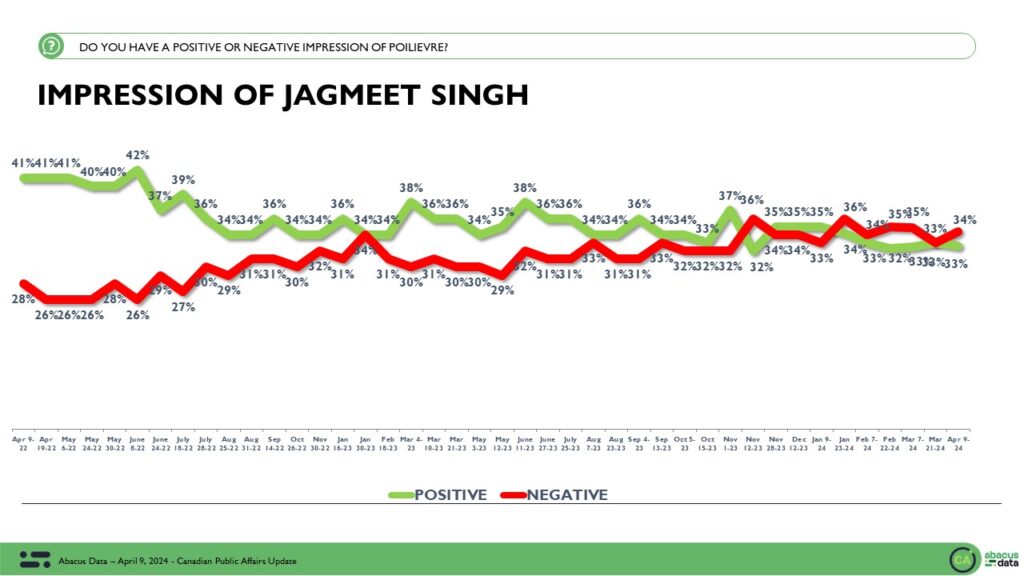
We also ask people whether their impression of each leader is getting better or worse over the past few weeks. Given the budget announcements were happening while this poll was in field, this is a good measure to capture whether any positive momentum was being generated by the announcements.
Overall, nothing has really changed from March. 13% say their impression of Justin Trudeau is improving while 47% say it is getting worse. 40% say it is not changing. All of these measures are close to where they were in March.
In contrast, 33% say their impression of Pierre Poilievre is improving while 22% say it is getting worse meaning his net positive momentum score of +11 is substantially better than the Prime Minister’s net -34.
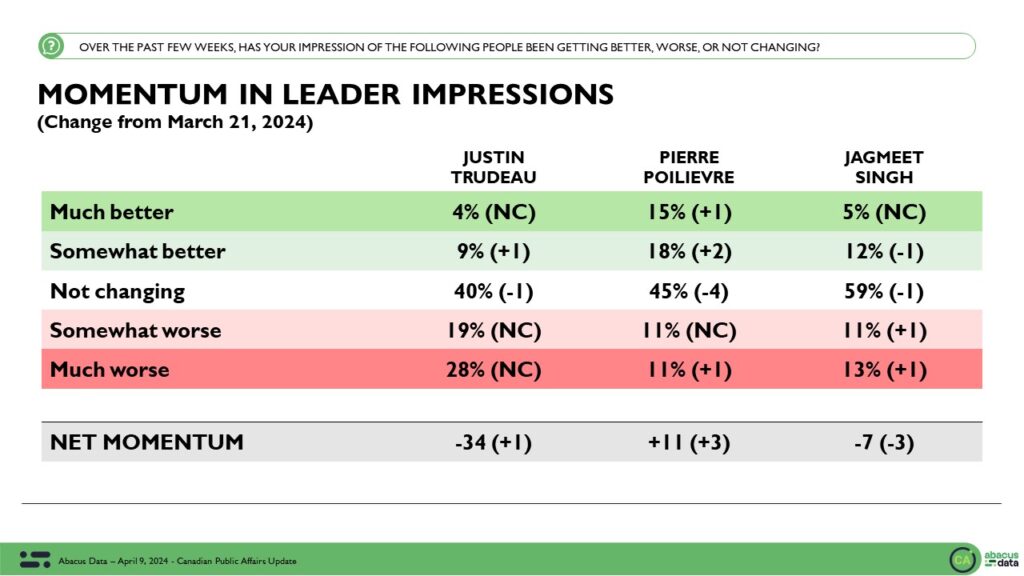
17% of Canadian adults believe Justin Trudeau and the Liberals deserve to be re-elected, up 2 from last month but still beloieve where it was last June while those who think it’s time for a change and feel there’s an acceptable alternative is at 54%, almost up 2. We will continue to monitor this perception as it may be a leading indicator for vote intention.
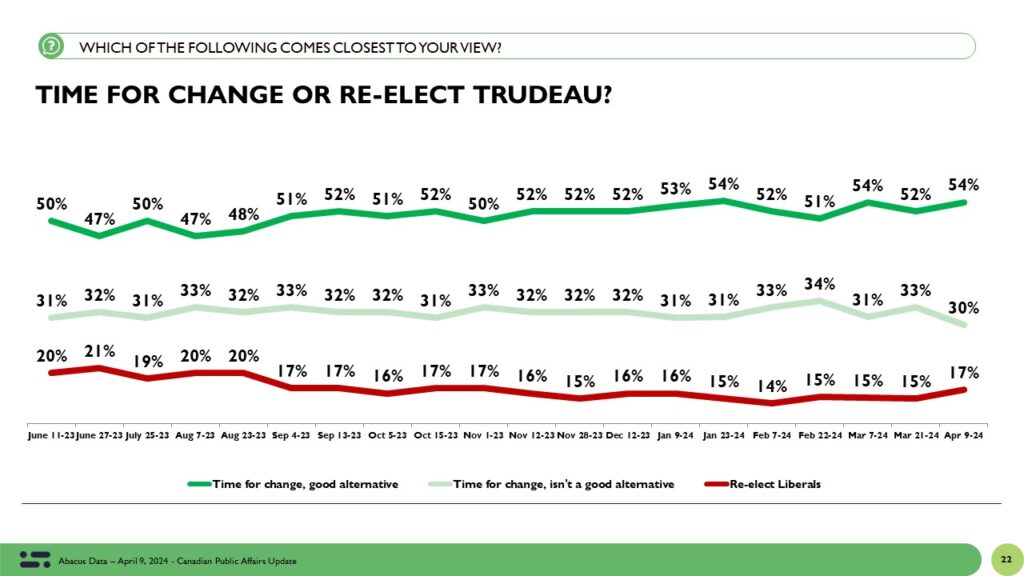
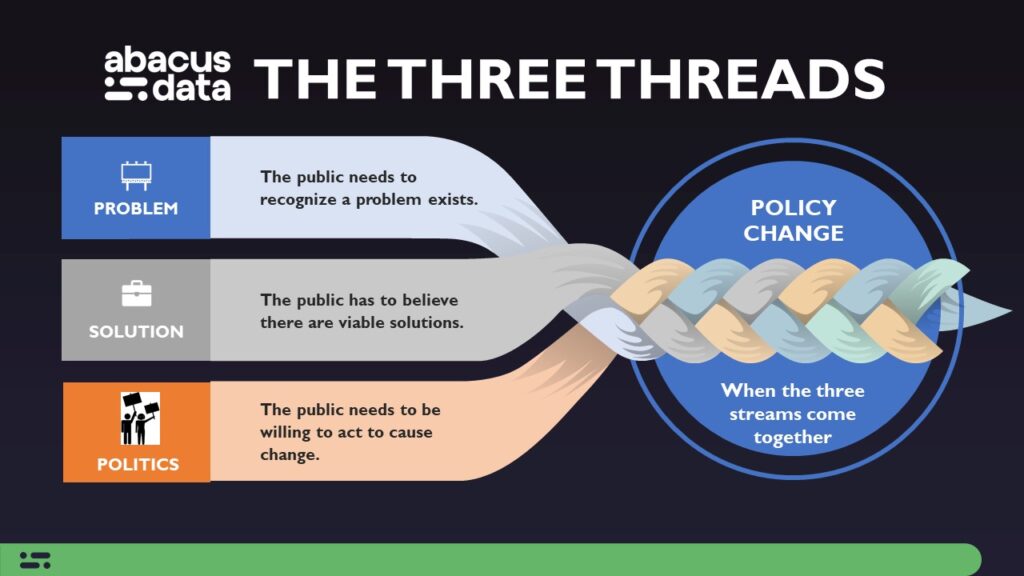
at polling for public affairs and advocacy.
In this survey we also re-asked a question we posed back in November 2023 gauging who Canadians think would better handle several policy areas – if the choice was between Justin Trudeau and Pierre Poilievre.
Overall, impressions have only marginally changed from the end of last year. Canadians are more likely to think that Poilievre is better able to keep taxes as low as possible (50% vs. 20%), make life more affordable (47% vs. 24%), and manage the economy (47% vs. 25%). Poilievre also has an advantage over Trudeau on dealing with another President Trump (43% vs. 26%), and building more housing (43% vs. 29%).
Even with all the housing announcements over the past week, perceptions of who is best to handle housing have not changed from last November suggesting either those announcements haven’t yet sunk in or there’s little the Liberals can do to change perceptions on their own.
Justin Trudeau has the advantage over Poilievre on two issues – childcare (37% vs. 33%) and climate change (38% vs. 31%).
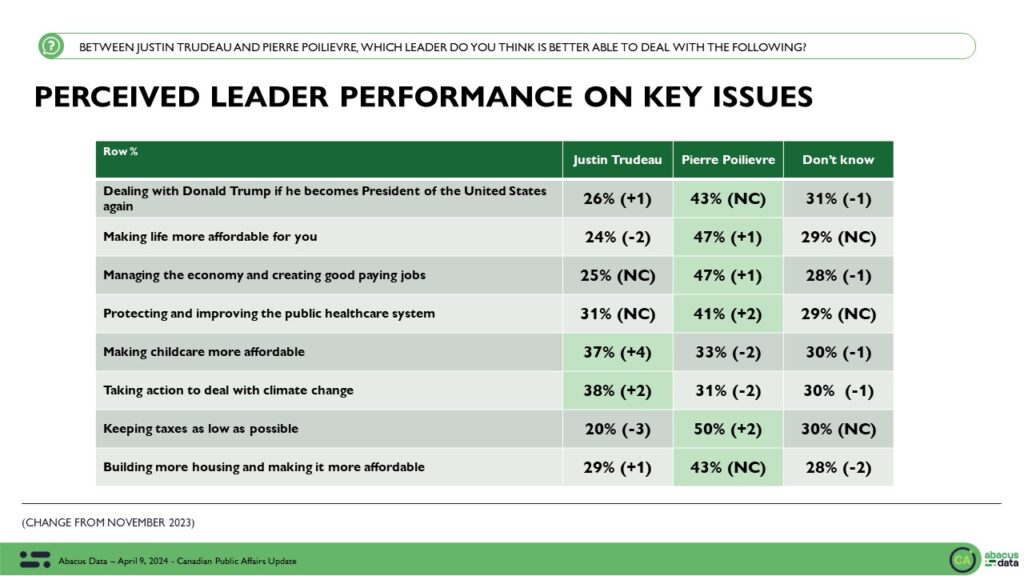
Do Budget Announcements Move Votes?
This is a difficult question to answer, but in this survey we asked Canadians two additional questions to try and gauge how far an announcement can go and to assess their impact.
On April 1, Prime Minister Trudeau and several cabinet ministers announced the plan to develop a National School Food Program.
First, less than half of Canadians were aware of the program announcement. 45% said they were aware of the announcement versus 55% who reported being unaware. Parents with kids aged 3 to 14 years of age were actually less likely to be aware of the announcement (41%) than everyone else.
Second, the idea in of itself is fairly popular. 44% of Canadians think it is a good idea, 37% think its an acceptable idea while 19% think it’s a bad idea.
But here’s the key point. This doesn’t look to have had any impact on vote intention yet and may not. Why?
68% of current Conservative supporters think it’s a good or acceptable idea as fo 93% of NDP, 90% of Green, and 84% of BQ supporters.
75% of those who want a change in government and think there’s a good alternative to the Liberals and Conservatives think the policy is a good or acceptable idea.
And even 2 in 3 of those who have a very negative impression of Justin Trudeau think it’s a good idea.
You can like the policy but still not like the government or the Prime Minister which is how I think most people will react to the policy, but we will need more time and data to be sure.
The Upshot
According to Abacus Data CEO David Coletto: “There are a few things to take away from this latest poll.
First, the carbon price increase on April 1 has not yet had any noticeable impact on Liberal support but if anything, may have helped the Conservatives. We will need a few more weeks of data to know this forsure. This means that political harm of the carbon tax may have run its course and things can’t get too much worse for the Liberals.
Second, despite promising to spend billions more and unveiling key parts of the budget while this survey was in field, the Liberals find themselves further behind the Conservatives in our vote intention tracking than at any point in our tracking. There has been no real change in support among younger Canadians – an audience the budget announcements have been focused on.
That could change as more and more people become aware of the budget policies but as this data showed, there are a lot of people who can like a policy but still not like the government. This is where I think the Trudeau government finds itself right now.
The problem may not be one of policy, but of leadership.”
Methodology
The survey was conducted with 2,000 Canadian adults from April 3 to 9, 2024. A random sample of panelists were invited to complete the survey from a set of partner panels based on the Lucid exchange platform. These partners are typically double opt-in survey panels, blended to manage out potential skews in the data from a single source.
The margin of error for a comparable probability-based random sample of the same size is +/- 2.1%, 19 times out of 20.
The data were weighted according to census data to ensure that the sample matched Canada’s population according to age, gender, educational attainment, and region. Totals may not add up to 100 due to rounding.
This survey was paid for by Abacus Data Inc.
Abacus Data follows the CRIC Public Opinion Research Standards and Disclosure Requirements that can be found here: https://canadianresearchinsightscouncil.ca/standards/
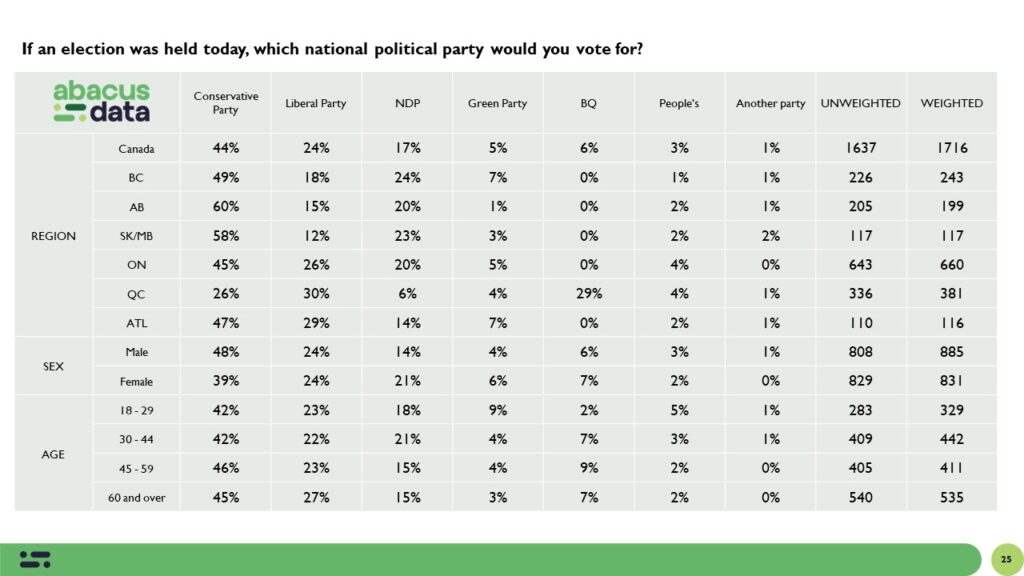
ABOUT ABACUS DATA
We are Canada’s most sought-after, influential, and impactful polling and market research firm. We are hired by many of North America’s most respected and influential brands and organizations.
We use the latest technology, sound science, and deep experience to generate top-flight research-based advice to our clients. We offer global research capacity with a strong focus on customer service, attention to detail, and exceptional value.
And we are growing throughout all parts of Canada and the United States and have capacity for new clients who want high quality research insights with enlightened hospitality.
Our record speaks for itself: we were one of the most accurate pollsters conducting research during the 2021 Canadian election following up on our outstanding record in the 2019, 2015, and 2011 federal elections.
Contact us with any questions.
Find out more about how we can help your organization by downloading our corporate profile and service offering.
